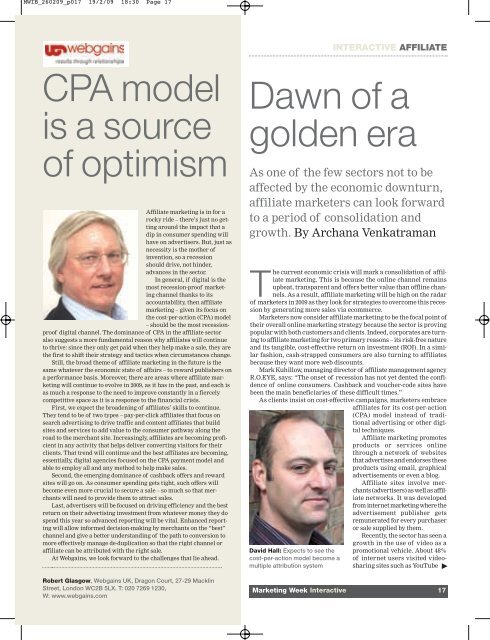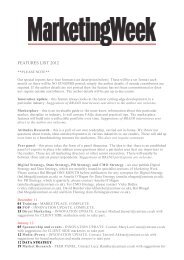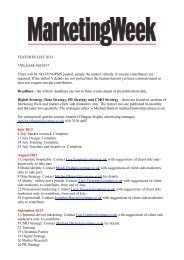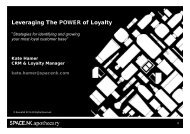Interactive Seven 2009 Supplement - Marketing Week
Interactive Seven 2009 Supplement - Marketing Week
Interactive Seven 2009 Supplement - Marketing Week
You also want an ePaper? Increase the reach of your titles
YUMPU automatically turns print PDFs into web optimized ePapers that Google loves.
MWIB_260209_p017 19/2/09 18:30 Page 17<br />
INTERACTIVE AFFILIATE<br />
CPA model<br />
is a source<br />
of optimism<br />
Affiliate marketing is in for a<br />
rocky ride – there’s just no getting<br />
around the impact that a<br />
dip in consumer spending will<br />
have on advertisers. But, just as<br />
necessity is the mother of<br />
invention, so a recession<br />
should drive, not hinder,<br />
advances in the sector.<br />
In general, if digital is the<br />
most recession-proof marketing<br />
channel thanks to its<br />
accountability, then affiliate<br />
marketing – given its focus on<br />
the cost-per-action (CPA) model<br />
– should be the most recessionproof<br />
digital channel. The dominance of CPA in the affiliate sector<br />
also suggests a more fundamental reason why affiliates will continue<br />
to thrive: since they only get paid when they help make a sale, they are<br />
the first to shift their strategy and tactics when circumstances change.<br />
Still, the broad theme of affiliate marketing in the future is the<br />
same whatever the economic state of affairs – to reward publishers on<br />
a performance basis. Moreover, there are areas where affiliate marketing<br />
will continue to evolve in <strong>2009</strong>, as it has in the past, and each is<br />
as much a response to the need to improve constantly in a fiercely<br />
competitive space as it is a response to the financial crisis.<br />
First, we expect the broadening of affiliates’ skills to continue.<br />
They tend to be of two types – pay-per-click affiliates that focus on<br />
search advertising to drive traffic and content affiliates that build<br />
sites and services to add value to the consumer pathway along the<br />
road to the merchant site. Increasingly, affiliates are becoming proficient<br />
in any activity that helps deliver converting visitors for their<br />
clients. That trend will continue and the best affiliates are becoming,<br />
essentially, digital agencies focused on the CPA payment model and<br />
able to employ all and any method to help make sales.<br />
Second, the emerging dominance of cashback offers and reward<br />
sites will go on. As consumer spending gets tight, such offers will<br />
become even more crucial to secure a sale – so much so that merchants<br />
will need to provide them to attract sales.<br />
Last, advertisers will be focused on driving efficiency and the best<br />
return on their advertising investment from whatever money they do<br />
spend this year so advanced reporting will be vital. Enhanced reporting<br />
will allow informed decision-making by merchants on the “best”<br />
channel and give a better understanding of the path to conversion to<br />
more effectively manage de-duplication so that the right channel or<br />
affiliate can be attributed with the right sale.<br />
At Webgains, we look forward to the challenges that lie ahead.<br />
.<br />
Robert Glasgow, Webgains UK, Dragon Court, 27-29 Macklin<br />
Street, London WC2B 5LX. T: 020 7269 1230,<br />
W: www.webgains.com<br />
Dawn of a<br />
golden era<br />
As one of the few sectors not to be<br />
affected by the economic downturn,<br />
affiliate marketers can look forward<br />
to a period of consolidation and<br />
growth. By Archana Venkatraman<br />
The current economic crisis will mark a consolidation of affiliate<br />
marketing. This is because the online channel remains<br />
upbeat, transparent and offers better value than offline channels.<br />
As a result, affiliate marketing will be high on the radar<br />
of marketers in <strong>2009</strong> as they look for strategies to overcome this recession<br />
by generating more sales via ecommerce.<br />
Marketers now consider affiliate marketing to be the focal point of<br />
their overall online marketing strategy because the sector is proving<br />
popular with both customers and clients. Indeed, corporates are turning<br />
to affiliate marketing for two primary reasons – its risk-free nature<br />
and its tangible, cost-effective return on investment (ROI). In a similar<br />
fashion, cash-strapped consumers are also turning to affiliates<br />
because they want more web discounts.<br />
Mark Kuhillow, managing director of affiliate management agency<br />
R.O.EYE, says: “The onset of recession has not yet dented the confidence<br />
of online consumers. Cashback and voucher-code sites have<br />
been the main beneficiaries of these difficult times.”<br />
As clients insist on cost-effective campaigns, marketers embrace<br />
affiliates for its cost-per-action<br />
(CPA) model instead of traditional<br />
advertising or other digital<br />
techniques.<br />
Affiliate marketing promotes<br />
products or services online<br />
through a network of websites<br />
that advertises and endorses these<br />
products using email, graphical<br />
advertisements or even a blog.<br />
Affiliate sites involve merchants<br />
(advertisers) as well as affiliate<br />
networks. It was developed<br />
from internet marketing where the<br />
advertisement publisher gets<br />
remunerated for every purchaser<br />
or sale supplied by them.<br />
Recently, the sector has seen a<br />
growth in the use of video as a<br />
David Hall: Expects to see the promotional vehicle. About 48%<br />
cost-per-action model become a of internet users visited videosharing<br />
sites such as YouTube multiple attribution system<br />
<br />
<strong>Marketing</strong> <strong>Week</strong> <strong>Interactive</strong> 17








